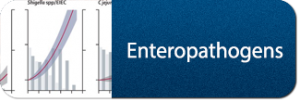Tuberculosis Research
Mycobacterium tuberculosis
Mycobacterium tuberculosis remains the world’s most deadly, but curable, infectious disease. 10.4 million new cases and 1.8 million deaths were attributed to this disease in 20151 and it is the leading killer of HIV-infected patients globally. More troubling is that approximately 480,000 of the new cases were multi-drug resistant (MDR-TB), meaning that these infections were resistant to both isoniazid and rifampin, two front-line drugs in the fight against tuberculosis. Such infections hamper public health gains in TB-endemic settings.
Our research focuses on improving patient outcomes through the development of rapid diagnostics that can identify which drugs to use for MDR-TB, as well as identifying markers for poor therapeutic response.
Diagnostics and Pharmacotherapy for Severe Forms of Tuberculosis
Funded through an NIH International Collaborations in Infectious Diseases Research (ICIDR) mechanism, this project is currently developing a multi-site observational cohort of TB patients to determine pharmacokinetic measures that correlate with treatment outcomes as well as deploy and enhance drug susceptibility testing while building on-site capacity for clinical investigation. We count as partners three sites in Tanzania including Kibong’oto Infectious Diseases Hospital, Kilimanjaro Clinical Research Institute, and Haydom Global Health Research Centre as will as the ICDDR,B in Bangladesh, Irkutsk Tuberculosis Referral Hospital and Scientific Centre for Family Health and Human Reproduction Problems in Russia, and the Mbarara University of Science and Technology in Uganda.
unMASC TB
This study represents a limited interventional protocol in Haydom, Tanzania to evaluate immunologic and molecular diagnostics as well as predictors of poor response to TB amongst children in Tanzania. The assay under study is a novel blood-based test that measures anti-mycobacterial antibodies. In addition, we are investigating drug concentrations in plasma to identify risk factors for poor treatment response. We are conducting this study at the Kilimanjaro Clinical Research Institute in Tanzania in partnership with the University of Florida Infectious Disease Pharmacokinetics Laboratory.
Bridge-Siberia
This study follows a prospective cohort of HIV-TB patients in Irkutsk, Russia to quantify the effect of substance abuse patterns on pharmacokinetics, treatment adherence, and treatment outcome. University of Virginia investigators include experts in adherence, mHealth, substance use psychology, and basic HIV biology. These experts include Dr. Rebecca Dillingham and Dr. Karen Ingersoll. Our research partners in Russia include the Irkutsk Tuberculosis Referral Hospital and the Scientific Centre for Family Health and Human Reproduction Problems.
Evaluation of Host Biomarkers for TB Diagnosis and Monitoring of TB Treatment Outcome
This case-control study among adults in Northern Tanzania aims to build local capacity for evaluating immunologic biomarkers of TB disease activity. Ongoing work focuses on evaluating cytokine and chemokine responses among adults with TB disease compared to hospitalized controls. For this study we are collaborating with researchers at Kibong’oto Infectious Diseases Hospital and Kilimanjaro Clinical Research Institute, both in Tanzania.
Non-Respiratory Biomarkers to Diagnose and Monitor Response in Pediatric TB
This is a prospective cohort study to optimize the accuracy of an anti-mycobacterial antibody secreting cell assay and to investigate trans-renal DNA as a diagnostic urine biomarker among young, malnurished children at risk for TB disease. Our research partners include researchers at the ICDDR,B in Dhaka, Bangladesh.
Household Contact Tracing in Northern Philippines (USAID PEER Health Cycle 5)
This public health study aims to address barriers to TB case detection among children from the Northern Philippines. The study begins by conducting household contact tracing among adults recently diagnosed with pulmonary TB in order to screen and identify children with active or latent TB infection. We will administer surveys amongst parents, other community members, and healthcare workers to assess knowledge, attitudes, and practices toward TB, and childhood TB in particular. The end goals are to increase detection of active TB among children, detect children eligible for isoniazid therapy, and develop a public health education campaign on childhood TB. Our partners include researchers at Isabella State University in Echague, the Republic of the Philippines Department of Health, and USAID-Philippines.
Collaborative TB Initiatives - UVA and the Virginia Department of Health
Through current and prior grant support through the National Institutes of Health and the Virginia Tuberculosis Foundation, we are focused on implementation studies such as early interventions for diabetes-TB in Virginia, therapeutic drug monitoring, clofazamine for drug-resistant mycobacterial disease, and the role of PET imaging. Through these collaborative efforts, UVA and the Virginia Department of Health shared the 2017 Robert Koch Award from the National TB Controller’s Association.
Molecular Diagnostics for Tuberculosis Drug Susceptibility Testing
Conventional diagnostic methods for tuberculosis drug susceptibility testing, such as culture-based phenotypic testing, can take weeks before results are available to inform proper therapy. Increasingly, faster culture-free genotypic methods for determining drug susceptibility are gaining popularity.
Tuberculosis TaqMan Array Card
Our group developed a TaqMan Array Card that incorporates both sequence-specific probes as well high-resolution melt analysis for genotypic DST. The primer-probe sets in the card are designed to interrogate 3,200 base pairs of critical regions of inhA, katG, rpoB, embB, rpsL, rrs, eis, gyrA, gyrB, and pncA.

Figure 2 from Pholwat et al., MBio 2015
Targeted Next-Generation Sequencing in M. tuberculosis Drug-Resistance Gene Regions
Probe-based and HRM-based diagnostics may not necessarily provide the sequence identify of a particular mutation. This identity is increasingly important since it has become clear that certain mutations at one location can contribute to drug resistance whereas others in the same location may not, such as in the pncA gene. We developed an amplicon-based next-generation sequencing assay covering 11 resistance-associated gene regions inhA, katG, rpoB, embB, rpsL, rrs, eis, gyrA, gyrB, and pncA covering 3,519 bases of the M. tuberculosis genome. In addition to drug susceptibility, this assay has allowed us to assess heteroresistance, or the co-occurrence of drug-sensitive and drug-resistance bacteria within a single isolate.
Reference:
Operario et al., Prevalence and Extent of Heteroresistance by Next Generation Sequencing of Multidrug-Resistant tuberculosis. PLoS One. May 2017; 12(5):e0176522
Current Collaborations
“REMODEL-TZ”- Research Capacity Strengthening Programme for Emerging and Re-Emerging Infectious Diseases in Tanzania.
Funded by the European and Developing Countries Clinical Trials Partnership, REMODEL-TZ is a senior fellowship for developing research capacity. Headed by Dr. Stellah Mpagama at the Kibong’oto Infectious Diseases Hospital, the major undertaking in this project is a randomized controlled trial of n-acetylcysteine for the prevention of ototoxicity in the treatment of MDR-TB in Tanzania. Our team at UVA is involved with the design of the clinical trial and analyses of the resulting data.
Halting the dual Tuberculosis and Diabetes Epidemic in Tanzania
Funded by the Danida Fellowship Centre under the Ministry of Foreign Affairs, Denmark, the aim of this project is to develop adaptive models and interventions for patients with a dual TB/Diabetes diagnosis, as well as for management and integration of services for Tanzanian patients of this type. This project is co-lead by Dr. Dirk Christensen at the University of Copenhagen and Dr. Stellah Mpagama at Kibong’oto Infectious Diseases Hospital. Our team at UVA is leading the effort to develop the testing capacity for therapeutic drug monitoring and assistance with designing clinical trials and ensuing data analysis.
View other areas of research:



1WHO Tuberculosis Fact Sheet, March 2017
